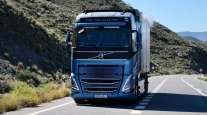Staff Reporter
Long Beach ‘Tri-Gen’ Ops Start for Toyota Vehicle Facility

An aerial view of the Toyota Tri-gen facility that opened at Pier B at the Port of Long Beach on May 2. (Port of Long Beach)
[Stay on top of transportation news: Get TTNews in your inbox.]
Civic officials and business executives on May 2 celebrated the opening of “Tri-gen,” an energy generation project that converts biogas from California landfills into hydrogen, electricity and water. It will power Toyota Motor North America Inc.’s vehicle processing and distribution center at the Port of Long Beach.
“The dawn of the renewable hydrogen era is upon us, thanks to our collaboration with Toyota, FuelCell Energy and their innovative Tri-gen system," Port of Long Beach CEO Mario Cordero said. The green power generated by the Tri-gen system, and similar projects, is part of our multilayered strategy to fuel our goal to become the world’s first zero-emissions port.”
Using FuelCell Energy’s Tri-gen platform, Long Beach is Toyota’s first port vehicle processing facility using 100% renewable energy generated on-site. The fuel cell technology uses an electrochemical process to convert directed renewable biogas into electricity, hydrogen and usable water using an efficient, combustion-free process described as releasing no air pollutants.
This advanced power generation system was created to support Toyota Logistics Services’ process and distribute vehicles from Long Beach at the company’s largest North American vehicle processing facility, which receives about 200,000 new Toyota and Lexus vehicles each year.
Tom Stricker, Toyota group vice president of sustainability and regulatory affairs, said the goal of the collaborative project was to use renewable energy at the vehicle processing facility in the Port of Long Beach to remove carbon dioxide emissions from the company’s operations.
“This groundbreaking facility shows that there are ways to reduce our emissions and burden on natural resources with scalable technology based on hydrogen,” Stricker added.
The Tri-gen system can generate up to 1,200 kilograms daily of hydrogen for fuel cell electric vehicles (such as the Toyota Mirai midsize car) that are imported to the terminal while providing power to supply an adjacent hydrogen refueling station to support Toyota Logistics Services and heavy-duty drayage trucks operating in the port complex.
RELATED: Commercial Hydrogen Fueling Station to Open in California
“As of Jan. 1, 2024, California’s Advanced Clean Fleet regulation will only allow zero-emission trucks to newly register as drayage trucks. By 2035, all drayage trucks will be required to be zero-emission,” according to FuelCell Energy. “Hydrogen production can be ramped up and down based on demand.”
Its Tri-gen platform now supports fuel cell electric Class 8 trucks with plans to provide energy as California plans to move to zero-emission drayage trucks by 2035. In January, Toyota used the renewable hydrogen produced at Tri-gen to fill the first Toyota Mirai vehicles in Long Beach. Then in April, the first heavy-duty fuel cell Kenworth T680 Class 8 truck was filled at an adjacent hydrogen fueling station using Tri-gen-produced hydrogen, FuelCell Energy noted.
Today, FuelCell Energy and @ToyotaMotorCorp will celebrate the grand opening of "Tri-gen" -- a first-of-its-kind system that uses biogas to produce renewable electricity, renewable hydrogen, and usable water.
Read more ⬇️ https://t.co/y5OUwct2Ug — FuelCell Energy (@FuelCell_Energy) May 2, 2024
Using hydrogen-powered fuel cell Class 8 trucks in port operations is projected to reduce diesel consumption by more than 420,000 gallons per year.
The water byproduct of Tri-gen can yield some 1,400 gallons of usable water, which can provide a source for Toyota’s car wash operations for vehicles coming into the port before customer delivery. This repurposed water can alleviate demand on local water supplies by 500,000 gallons annually.
MORE: ATRI: California’s Zero-Emission Goal Comes at High Cost
“Tri-gen demonstrates that hydrogen-based energy benefits businesses, delivers zero-emission transportation for light- and heavy-duty transportation, supports improved air quality in local communities, reduces water usage, and delivers immediate and long-term benefits to the environment,” FuelCell Energy CEO Jason Few said.
Some of the Tri-gen electricity will be used in Long Beach port operations, and other generation is being transmitted to Southern California Edison under the California Bioenergy Market Adjustment Tariff program.
Want more news? Listen to today's daily briefing below or go here for more info:




